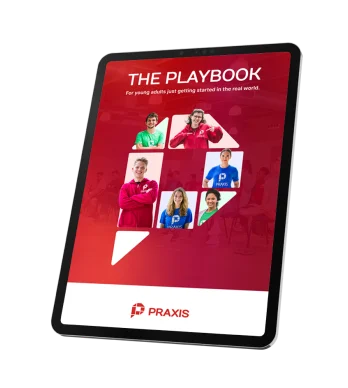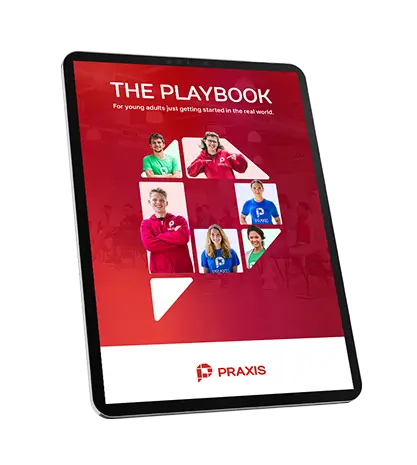- Home >
- Resources >
- How To Achieve Escape Velocity In Your Career
If you really want freedom in your life and career, you need to achieve escape velocity.
In order to do that you must break norms. Because normal does not lead to freedom.
Many people aren’t as free as they believe. Much of their time is governed by external factors – like a need to make money, work/social/familial obligations, student or consumer debt, a need or desire for social status, and so on.
To paint with broad strokes, people who fail to achieve escape velocity spend their careers puttering around. They hop from job to job or stay around at one company for longer than necessary but the story is the same. They’re passed over for promotions. Their income remains stagnant, usually limited to annual cost of living raises that don’t beat inflation. They trade away their agency to the company they work for.
People who reach escape velocity take a different course. It usually looks like they’re behind for the first couple years. Then all at once, their trajectory explodes. Figuratively speaking, they reach the necessary velocity to leave Earth’s orbit.
When you reach escape velocity, interesting things begin to happen.
Added responsibility finds you. Your income usually skyrockets. Career opportunities seek you out. Paths emerge in front of you. Escape velocity creates optionality.
TLDR; achieving escape velocity grants you the freedom and optionality to choose how you spend your time.
Escape Velocity Is Not Easy
The corollary is that escape velocity requires an incredible amount of energy, focus, effort, growth, and creativity – condensed into a short period of time.
You don’t just wake up one day, clock in at your job, and get promoted to CEO. That’s not how escape velocity happens.
If you want to achieve escape velocity, you need to cram a decade’s worth of effort into a few years. As venture capitalist Paul Graham once wrote, “if you want to make a million dollars, you have to endure a million dollars’ worth of pain. For example, one way to make a million dollars would be to work for the Post Office your whole life, and save every penny of your salary.”
The same is true in your career. If you want to skip 20 years on the ladder, you need to condense those 20 years into a short span instead.
Easier said than done.
But it’s more than possible. It’s highly probable. If you’re clever. Or – clever or not – if you’re deliberate.
There are paths that lend themselves to achieving escape velocity with a high degree of likelihood.
Escape Velocity Through Sales
The first and possibly simplest path is to start your career in sales. By learning to sell, you will learn how to translate your time, energy, and skills into income. This is a super skill. Whether you’re selling Cutco door-to-door doing selling software, the essentials of sales are the same. Find problems and offer solutions at prices others are willing to pay.
Success in a sales career directly translates to higher income. Higher income is one way to buy back your freedom. You can save more. You can invest. You can build an escape plan. Or, you can continue to drive your income higher and higher, while learning how to become more efficient with your time.
Sales offers one way to achieve escape velocity. And it doesn’t require 10 years. Countless Praxis alumni have hit the 6-figure mark early in their 20s after going all-in on sales careers. If you can make that kind of money while your expenses are still laughably low, you can get years – even decades – ahead financially.
Escape Velocity Through Apprenticeship
Apprenticeship offers another route to escape velocity. The curve looks different from sales. The earnings start and continue lower – eventually they’ll pop.
It’s no guarantee you’ll ever make as much money as you might in sales, but escape velocity is not just a matter of income. There are more kinds of freedom than financial freedom.
Apprenticeship offers a route to optimize for the kind of work you want to do. You achieve freedom by positioning yourself where you want to be, rather than building a career doing something you hate.
Through apprenticeship, you set out to study from someone who is already doing what you want to go – while getting paid to learn. As you pick up the craft, your responsibility grows, and so will your income. Eventually, you earn a position. Or you develop the credibility to go off on your own. Either way, you can increase ownership of your time and situation quickly, relatively speaking.
For example, I knew I wanted to run a business someday. I landed an apprenticeship under the Founder and CEO of an early-stage startup. I spent three years as his right hand as the company grew from 20 employees to over 200; and from around $1,000,000/yr in revenue to nearly $10,000,000/yr in revenue.
In the time it took some of my friends from college to graduate law or business school, I achieved escape velocity. I went from apprentice to executive. I learned how to build a business. I increased my income 5x.
I learned what I wanted and needed to know to put myself in the position to go do what I originally set out to do – and I’d done it from a position of relative financial strength. Rather than going $100k in debt to get an MBA and learn about build a business theoretically, I increased my income year-over-year and saved a bunch of money, while learning hands-on how to do what I wanted to learn how to do.
Apprenticeship offers another predicable route to achieving escape velocity. But it’s not always as simple as applying to jobs. Often, you will need to create your own role, or convince someone else to hire you as a generalist – and then prove you’re someone worth investing in. It’s not easy. But it has good odds for achieving escape velocity.
Escape Velocity Through Entrepreneurship
Maybe the most effective – yet most difficult – path to achieving escape velocity is entrepreneurship.
The odds of business success are low. Very low. Your first business will probably fail.
But successfully achieving escape velocity is not about your first business. Or second business.
It’s about building your launch infrastructure. Developing your skills. Your confidence. Your body of work. Your experience. Your network. Your intuition.
In order to do that, you need reps. The best way to get reps? Get started. Literally start a business. Any business. Take it seriously. Go all-in on it until you fail or it succeeds or you change your mind. Then repeat. If you’re young and don’t have a ton of money, don’t worry. That can be a benefit. Because you’ll be forced to start a business that has lower costs to start – which also means less financial risk.
It will be brutal. You’ll develop thick skin. You’ll learn and grow. But so long as you stay in the game, continue developing your skill set, continue perfecting your business, eventually success will flip from impossible to inevitable.
Entrepreneurship offers a predictable path to escape velocity. You can design your life and your business simultaneously. In a way, building a business is a lot like terraforming your own personal universe. You get to decide how to do everything. You get to call the shots. Your decisions are to your own benefit or detriment. And if your business succeeds, eventually, the money will follow too.
But more important than business success or money success, the point of escape velocity is to break free from the gravitational force that holds you back from designing your life and career into what you want it to be. In that arena, entrepreneurship – though high stakes – offers the greatest measure of autonomy.
A Few Final Words on Escape Velocity
The three paths I laid out are by no means a comprehensive list of paths for achieving escape velocity early in your career.
But they all share in common one trait: they have high probability of success for building the “right stuff” you need to achieve escape velocity. Experience. Skills. Relationships. Confidence. Intuition. Reputation.
Whether you succeed financially or not while you’re young is beside the point. The best way to achieve escape velocity is by focusing on the traits that increase your probability over time.
Remember, you’re building your launch infrastructure. You may have a few failures – a “rapid unscheduled disassembly” or two, if you will.
But if your goal is ownership over your life and career, aiming to achieve escape velocity is one of the most effective goals you can set.
It will force you to prioritize the right stuff over the normal stuff. The stuff that actually leads to results you want.
That’s all for today. More on this again soon.
Share Post
Praxis






